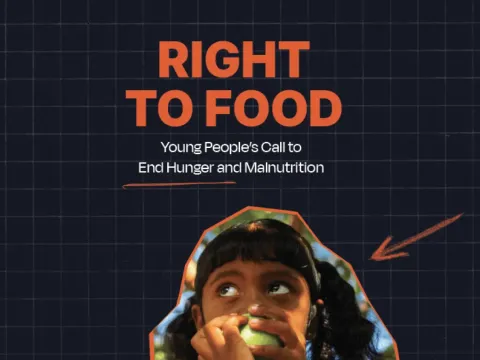Children and youth-led research unlocks solutions to end hunger and malnutrition in Asia-Pacific

- A new study, led by children and youth researchers in the Asia-Pacific, provides first-hand evidence and an action agenda challenging governments to partner with them to end malnutrition.
- Food is a Right - young participants demanded nutritious food be guaranteed for all, citing cost, quality, and access as the top barriers driving food insecurity.
The research mandates immediate policy change, calling for free, nutritious school breakfast and lunch programs to ensure no child or youth goes hungry.
Manila, Philippines; 27 November — A groundbreaking research report, “The Right to Food: Young People’s Call to End Hunger and Malnutrition,” delivers a powerful, evidence-based challenge to policymakers across Asia and the Pacific. The study was co-led by children and youth researchers, establishing that young people are informed change makers ready to lead and counter hunger and malnutrition with actionable solutions.Strengthening children and youth participation through research
The report is the product of a unique collaboration between World Vision’s CHAMP (Child-Led Advocacy and Meaningful Participation) initiative and the Young and Resilient Research Centre (Y&R) at Western Sydney University.
This initiative demonstrates a commitment to meaningful child participation by:- Training young experts: Fifteen youth leaders (aged 13–20) from five countries received comprehensive training in research methods.
- Facilitating peer-to-peer data collection: These young researchers then led ten workshops, engaging 214 participants (ages 10–18) to gather rich, firsthand quantitative and qualitative data on their experiences with food insecurity.
Distinguished Professor George Williams AO, Vice-Chancellor and President, Western Sydney University, highlighted the study's significance: “Informed by children, this report highlights some of the challenges that children and young people experience in trying to access enough nutritious food and how they believe these barriers can be overcome. I hope this report inspires decision-makers to address nutrition and hunger-related issues at a time when it is needed most.”
Key Findings: The Children and Youth Perspective on Systemic Malnutrition Barriers
Against a backdrop where the region grapples with the "triple burden" of malnutrition (undernutrition, overnutrition, and micronutrient deficiencies), young people provided nuanced insights into the systemic failures driving the crisis: - Nutrition is a right, not a privilege: Participants strongly rejected the notion that access to nutritious food should be contingent on wealth, noting that low-income families are often forced to rely on cheaper, processed foods that lack essential nutrients.
- Schools as the frontline: They called for immediate, concrete action within educational settings, specifically advocating for free, nutritious breakfast and lunch programs and healthier canteen options to ensure schools are places where no child is left hungry.
- Three primary obstacles: The young researchers identified and prioritised the three main barriers to healthy diets: cost (rising food prices), access (limited availability of fresh produce in communities), and food quality (concerns over chemical use and pollution).
Youth-Led Solutions: Priorities from Children and Youth Leaders
Based on their evidence, the CHAMP leaders put forth a powerful set of children and children and youth-led solutions, directly urging governments and policymakers to act as true partners: - Make long-term financial commitments to food security and make nutrition a community-wide priority.
- Tackle poverty and economic inequality, including inflation and unemployment, by strengthening social protection systems.
- Transform Food Systems by supporting local, sustainable, and climate-smart agriculture, alongside implementing safer farming practices with reduced chemical use.
Implement regulatory measures like pricing controls and restrictions on marketing unhealthy foods, while integrating comprehensive nutrition education into schools and communities.
Sarah Bearup, Chief Operating Officer of World Vision South Asia and the Pacific, underscored the power of this participatory approach: “When we equip young people with the right tools, they do not just participate; they lead. Through this initiative, we have witnessed a powerful youth-led movement that is shaping policy and driving progress toward the Sustainable Development Goals. It is grounded in lived experience and speaks boldly to the agency of children and young people today. Their insights are more than data; they are a call to action. It is a reminder to all of us that creating a world where no child goes hungry requires listening to young voices and working alongside them as true partners in change.”
-ENDS-For arrangements with media, contact:
Aaron Aspi | email: aaron_joseph_aspi@gmail.comCommunications Adviser, World Vision South Asia and Pacific